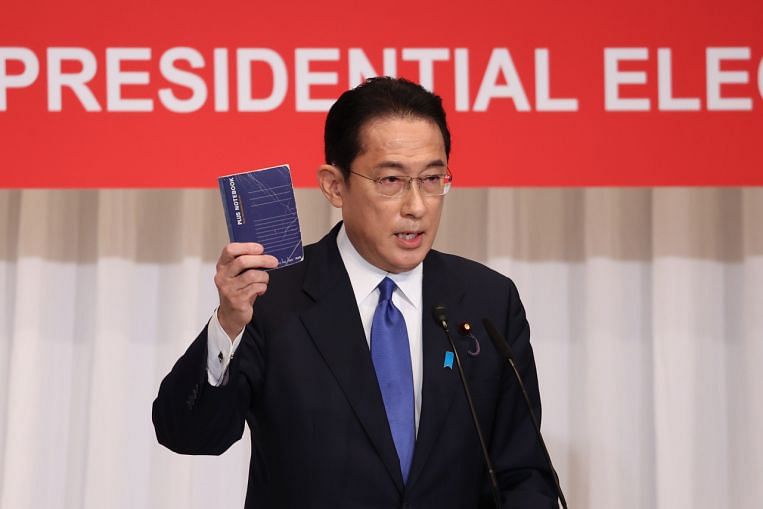
TOKYO – Elite conservative power brokers defeated public sentiment on Wednesday (Sept 29) as Japan’s former foreign minister Fumio Kishida was elected by the ruling Liberal Democratic Party (LDP) as its choice for the next Prime Minister.
The 64-year-old will be sworn in next Monday when the Diet convenes to choose Mr Yoshihide Suga’s successor, in a vote that is merely procedural given the LDP coalition’s majority in both chambers of Parliament.
Mr Kishida’s most immediate task will be to unite a divided party with an eye on a general election that must be held by November, as four-year Lower House lawmaker terms are due to expire on Oct 21.
“The LDP leadership election is over. Let us all face the Lower House and (next year’s) Upper House elections as one,” Mr Kishida said in his acceptance speech.
“We must put together a stimulus package of tens of trillions of yen by the end of the year and beyond that important problems are piling up for our nation – a new capitalism and realising a free and open Indo-Pacific, as well as dealing with the low birth rate,” he added.
A moderate party stalwart who was a right-hand man to former prime minister Shinzo Abe, Mr Kishida is seen within the LDP’s conservative ranks as a safe pair of hands, but perceived by the public as boring.
The public’s favourite for the next PM is administrative reform and vaccination minister Taro Kono, 58, who lost to Mr Kishida over two rounds of voting on Wednesday.
Mr Kono is an English-speaking media darling whose maverick reformist credentials do not sit easy with the LDP’s conservative base, even as the public regards him highly on his ability to bash through bureaucratic red tape to get things done.
Both men were neck in neck in the first round, when two former internal affairs ministers were also in the fray. Of the 762 votes cast, Mr Kishida won 256 votes, narrowly edging out Mr Kono by one vote. Ms Sanae Takaichi, 60, a staunch conservative backed by Mr Abe, scored 188 votes while Ms Seiko Noda, 61, whose platform is children- and women-centric, earned 63 votes.
As none of the candidates scored more than half of the votes, the top two finishers faced off in a run-off where Mr Kishida scored 257 votes and Mr Kono, 170 votes, of the 427 ballots cast.
The breakdown of the party rank-and-file votes, however, clearly showed Mr Kono as the favourite in 39 out of Japan’s 47 prefectures.
Mr Kono said in his concession remarks that he lost due to “his own lack of ability”, apologising to his supporters and vowing to support Mr Kishida with all his might and pledging to do his best where he is needed.
Political scientist Toru Yoshida of Doshisha University in Kyoto, told The Straits Times: “LDP lawmakers seem to have been quite relaxed to see that the party’s support has received a boost with Suga’s resignation.”
He added: “They might have felt more secure with Kishida, who opts for a more harmonised style of leadership, than with Kono, in their choice to keep the status quo.”
Mr Kishida, in a victory press conference, alluded to his weaknesses and vowed to listen to the voices of the people and win them over step by step. With Mr Abe and Mr Suga having faced flak for being out of touch, he repeatedly said that he will “sincerely explain” the government’s position to the public.
He added that he will continue Suga-era policies on climate change and digital transformation.
On the campaign trail, Mr Kishida also pledged to strengthen Japan’s security ties with its like-minded partners, while saying that Japan must boost its defence spending to cope with growing security threats including around the Taiwan Strait.
But in a move that is bound to upset China, Mr Kishida has vowed to appoint a special ministerial aide on human rights.
He has also pledged at least 30 trillion yen (S$365.4 billion) in stimulus spending to achieve what he has termed a “new form of capitalism” that embodies fairer wealth distribution, noting that Mr Abe’s signature Abenomics policies had catalysed social inequality.
Mr Kishida, whose grandfather and father were Lower House politicians representing their ancestral Hiroshima prefecture, is a ninth-term lawmaker who was first elected in 1993.
He is second time lucky, having competed in last year’s LDP leadership race to succeed Mr Abe, which he lost to Mr Suga.
He is known for his ability to hold his liquor. As foreign minister, he duelled with his Russian counterpart Sergei Lavrov to see how long they could keep a diplomatic conversation going over copious amounts of Russian vodka and Japanese sake.
He has three sons with his wife Yuko. His eldest son Shotaro, 30, is following in his footsteps and is now working as his secretary.
https://news.google.com/__i/rss/rd/articles/CBMiemh0dHBzOi8vd3d3LnN0cmFpdHN0aW1lcy5jb20vYXNpYS9lYXN0LWFzaWEvZnVtaW8ta2lzaGlkYS13aW5zLWxkcC1wb2xsLXRvLXN1Y2NlZWQteW9zaGloaWRlLXN1Z2EtYXMtamFwYW5zLXByaW1lLW1pbmlzdGVy0gEA?oc=5
2021-09-29 10:01:05Z
52781906937595
Tidak ada komentar:
Posting Komentar